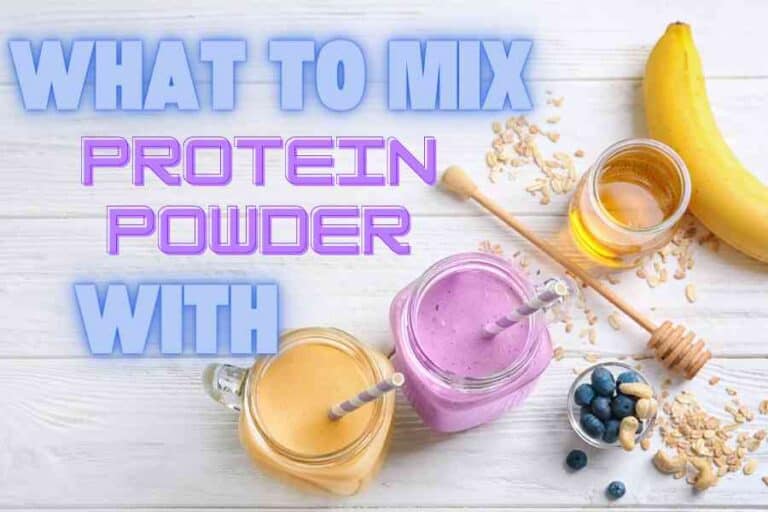Oat milk vs Almond milk: Which Is Better For You?

Great! So you’ve been searching for the best plant-based milk on the market today and narrowed it down to the two most popular plant milks: Oat milk vs almond milk.
Well, which one is the better milk?
Oat milk and almond milk are both non-dairy milks that have their own unique taste and individual health benefits. Both options are great depending on your nutritional needs and of course, taste buds. As someone that has been drinking almond and oat milk for the last 12 years, I definitely prefer one over the other.
In this article, I will cover everything you need to know about oat milk and almond milk, and which is better for you- settling the oat milk vs almond milk debate once and for all.
Now let’s go ahead and figure this out!
What is oat milk?

Oat milk is a popular plant-based, dairy-free milk alternative made from whole oats that are soaked, blended, and strained, to make a satisfyingly sweet and creamy plant milk. Oat milk is a great option for anyone who is lactose intolerant or has a nut allergy or sensitivity.
Most oat milks on the market today have been fortified with essential nutrients, making them highly nutritious and a great option for your morning cereal, coffee, baking needs or protein shake.
According to the USDA, one cup (250ml) of unsweetened oat milk contains the following:
| Nutrients (per 250ml) | Oat Milk |
|---|---|
| Calories (kcal) | 120 kcal |
| Carbohydrates (g) | 13 g |
| Protein (g) | 2 g |
| Fat (g) | 7 g |
| Sugars (g) | 6 g |
| Fiber (g) | 4 g |
Health Benefits of Oat Milk
Oat milk is naturally higher in fiber, due to its primary ingredient rolled oats or steel-cut oats. The active compound found in oat fiber, beta-glucan, is known to offer many health benefits.
The beta-glucan in oat fiber helps to slow down gastric emptying, meaning that it helps food stay in your stomach for a longer time. This can contribute to increased feelings of fullness, which help with weight management, and overeating.
Additionally, oat milk’s beta-glucan promotes better digestive health by increasing gastrointestinal transit time- in other words, how long it takes for food to travel through your digestive system. This results in improved nutrient absorption and helps stabilize blood sugar levels.
Research also suggests that beta-glucan can help lower your LDL (bad) cholesterol levels, which is great for promoting heart health.
Most oat milks have been fortified with vitamins and minerals such as vitamin B12, for healthy blood and DNA, calcium for heart and bone health, and riboflavin (vitamin B2) for adequate energy levels.
What Is Almond Milk?

Almond milk is another popular plant-based milk alternative that is great for those looking for low-calorie and highly nutritious non-dairy milk.
Similar to oat milk, almond milk is made by soaking almonds in water, blending them, and then straining the mixture to make almond milk. Almond milk has a thinner consistency, with a nuttier taste.
In addition, almond milk is also typically fortified with essential nutrients such as Calcium, Vitamin D, and Vitamin B12, to ensure a healthy and nutritious beverage.
According to the USDA, one cup (250ml) of unsweetened almond milk contains the following:
| Nutrients (per 250ml) | Almond Milk |
|---|---|
| Calories (kcal) | 48 kcal |
| Carbohydrates (g) | 2 g |
| Protein (g) | 1.6 g |
| Fat (g) | 4 g |
| Sugars (g) | 3 g |
| Fiber (g) | 2 g |
Health Benefits of Almond Milk
Almond milk is naturally high in nutrients such as vitamin E, which is a powerful antioxidant that helps protect your cells from oxidative damage against free radicals. In addition, vitamin E is an essential nutrient that cannot be produced by the body, which makes almond milk a great addition to the diet.
Almond milk is also rich in calcium which is essential for bone and heart health, where one cup of almond milk contains 395 mg of calcium. That’s about 30% of the daily recommended value!
Oat Milk vs Almond Milk: Pros & Cons
Both nondairy milks are great alternatives to dairy milk and offer many nutritional benefits. However, depending on your personal goals and dietary restrictions, it’s necessary to pick the plant milk that is best for your personal nutritional needs.
So let’s go ahead and compare the pros and the cons!
Oat Milk Pros
As mentioned, oat milk is packed with fiber, which can help to regulate your digestive system and keep you feeling full longer. Additionally, oat fiber is great for heart health as it helps reduce cholesterol levels.
Compared to almond milk, oat milk is higher in calories, making it a great option if you need extra energy during your strength or weight training session, or if you need a boost during your day-to-day activities.
If you’re anything like me and looking to gain a few more pounds of muscle mass, foods that contain more complex carbs are always best! Carbs are an essential macronutrient needed in large amounts to fuel your body for your daily activities. Oat milk contains more carbs per serving than almond milk, making it a great and healthy option to add to your protein shakes after an intense workout at the gym.
Protein is an essential macronutrient needed in large amounts as it is the main building block of your cells and important for building and maintaining muscle mass. When compared to almond milk, oat milk has a higher protein content, where one cup of oat milk contains approximately 2 grams of protein, whereas almond milk contains only approximately 1.6 grams of protein per cup.
Oat milk is naturally sweeter than almond milk or any other plant milk, making it easy to drink and great to add to smoothies and baked goods. This is also great for people who are looking for an alternative to dairy milk that still has a sweet taste.
Because it is a plant-based milk, oat milk is free of lactose and gluten, making it an excellent choice if you have any dairy, animal, and or gluten sensitivities, and/or allergies. However, it’s important to always check for the gluten-free label as some oat milks may experience cross-contamination due to being processed in the same facility as other gluten-containing products such as wheat.
Being nut free makes this plant milk a great option if you have any nut allergies or sensitivities.
Oat Milk Cons
Compared to almond milk, oat milk has a higher calorie, carb, and fat content. This is something to keep in mind if you are focusing on weight loss or maintenance, as opposed to weight gain. If are focusing on losing weight, and decide to go with oat milk, just be sure to monitor your calorie, carb, and fat intake closely.
The natural sugars in oats give oat milk a sweeter taste and higher sugar content when compared to almond milk. If you are on a low-sugar diet, be sure to monitor your sugar levels closely and read the nutrition labels as some brands of oat milks may contain added sugars and sweeteners.
Almond Milk Pros
Almond milk is typically fortified and packed with vitamins and minerals, making it a very nutritious beverage. Almond milk is naturally a great source of vitamin E, which is a powerful antioxidant to help to protect your cells, and fortified with vitamin B12, which helps keep you energized and promotes a healthy nervous system, and calcium and magnesium which are needed for healthy bones and heart health.
Compared to oat milk, almond milk has fewer calories carbs, and fats, making it a great option for those that are focusing on weight loss, and reducing their caloric intake. One cup of almond milk contains 1.5 grams of carbs, whereas oat milk has a whopping 13 grams of carbs per cup!
Almond milk naturally contains less sugar than oat milk, thereby making it a better option for anyone looking for a low sugar plant milk.
Because it is a plant-based milk, almond milk is free of lactose and gluten, making it an excellent choice if you have any dairy, animal, and or gluten sensitivities, and/or allergies.
Almond Milk Cons
Although almond milk may be beneficial for those who are looking to lose or maintain their weight or blood sugar levels, this milk may not be suitable for you if you are looking to increase your caloric, carb and protein to gain weight and/or build muscle mass.
Almond milk naturally contains less fiber than oat milk. This may not be a suitable option if you are looking to increase your dietary fiber.
Those that have a nut sensitivity or allergy should be cautious and not consume almond milk.
Oat Milk vs almond milk Comparison chart
| Nutrients per cup (250 ml) | Oat Milk | Almond Milk |
|---|---|---|
| Calories (kcal) | 120 kcal | 48 kcal |
| Carbohydrates (g) | 13 g | 1.6 g |
| Protein (g) | 2 g | 1.6 g |
| Fat (g) | 7 g | 4 g |
| Sugars (g) | 6 g | 3 g |
| Fiber (g) | 4 g | 2 g |
| Oat Milk | Almond Milk | |
|---|---|---|
| Taste & Texture | Sweet taste; Thick texture | Nutty taste; Thin texture |
| Nutritional Value | **Fortified with vitamins and minerals (vitamin A, B12, B2, D2, calcium and zinc) | **Fortified with vitamins and minerals (vitamin A, B12, B2, D2, calcium and zinc) |
| Versatility | Can be used in all beverages, cereals, baking and cooking needs | Can be used in beverages, cereals; not so good for cooking or baking |
| Nut-Free Option | Naturally nut-free | Contains almonds; not suitable for those with almond allergy |
| Gluten-Free | May contain gluten, check label | Naturally gluten-free |
Final Thoughts
Whether you opt for oat milk or almond milk, both plant-based milks are healthy and nutritious alternatives, with many benefits.
Oat milk is a sweeter milk, that is high in fibre, calories, carbs and protein and great for those that are looking for a milk that can help them with gaining weight, along with improving their heart health and dietary fibre intake.
Where on the other hand, almond milk is a thin milk with a nuttier taste, high in vitamin E and lower in calories, carbs, sugars and fats, making it ideal for anyone that is on a low sugar and/or low carb diet.
I personally prefer oat milk over almond milk because of its higher carb and calorie content, which helps to support muscle growth and development- and the naturally sweet taste.
Ultimately, choosing which milk is best will depend on your dietary needs and/or restrictions. Both plant milks are great options, that offer many benefits. Be sure to choose wisely and as select a milk that will support your dietary and fitness goals.






